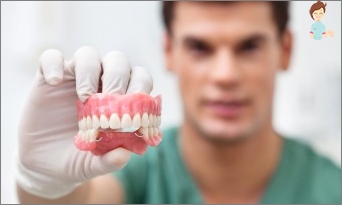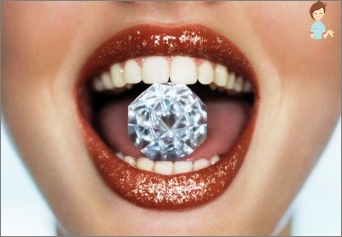Dental implantation
What is the implantation of teeth? What are the types of procedure? Indications and main contraindications for procedure. Advantages of teeth implantation
Modern ecology causes irreparable harm to health, and first of all it affects the skin, hair, and of course teeth. The problem of the teeth is due not only to the habitat, but also inheritance, and a person cannot change it, nor another.
Their loss is not only not aesthetics of smiles, but also internal discomfort, restriction of communication, which also entails the development of complexes. Fortunately, medicine does not stand still, and has found a solution to the problem of teeth restoration – their implantation.
In essence, implantation lies in the fact that in the gum to the place of the dropped tooth, a steel rod is introduced, on which the denture is attached.
Of course, such operations are carried out exclusively under anesthesia. In addition, it is necessary to carefully choose the clinic and specialist, because your smile is on horse!
Express implantation
One of the most common types of implantation is the express teeth implantation. It lies in the fact that the lusion occurs immediately after the removal process.
Do not think that you will perform a similar procedure according to your desire, not at all. For use by a doctor, the express of the implantation of the teeth is necessary.
Indications for express implantation:
 If trauma occurs, and damage is deeply under the gum fabric, thereby applying not only pain, but also harm to other teeth;
If trauma occurs, and damage is deeply under the gum fabric, thereby applying not only pain, but also harm to other teeth;- Serious destruction making impossible subsequent treatment;
- If the teeth have already been treated earlier and their further treatment is not possible.
This method has a number of advantages:
Standby time on the establishment of an implant. So, with conventional implantation, the patient must wait 1.5 months after the removal of the tooth itself and another 6 months while the implant takes place in the bone. When applied express implantation, the term is reduced to 6 months.
- Discomfort reduces;
- It is possible to install a temporary crown immediately after implantation;
- Basal implantation of teeth.
Another wide-applied new recovery method – basal teeth implantation. Its essence is that the special design is implanted, which is selected individually under each patient.
The method allows you to properly distribute the chewing load, in addition, it is the only way that allows you to restore all the teeth even with their absence.
When carrying out basal implantation of teeth, both types of implants are used, this is exactly what will allow uniformly distribute the load. This method helps to restore the bite, which was broken due to the lack of teeth, after it you can immediately give chewing load, and it helps implants better getting.
The main advantages of this method are:
- Risk of rejection is minimal;
- Acceptable to any part of the bone, does not depend on the atrophide of bone tissue, and the number of implants implant;
- Allows you to get rid of periodontalism;
- Suitable almost to all patients;
- It is possible even in periodontitis;
- It is applied immediately after removing the tooth;
- In most cases, additional buildup of bone tissue is required;
- Used for smokers;
- The risk of infection with infections is minimal, due to the stability of implants to various types of their.
Somnation implantation of teeth
 Sommonty teeth implantation – this method that allows you to install artificial units in just one visit to the doctor.
Sommonty teeth implantation – this method that allows you to install artificial units in just one visit to the doctor.
The implant is implanted to the place of the fallen tooth, to which the temporary crown is worn from above, which may have been withstanding a full-fledged chewing load after a few hours. But it is not worth overloading it, since the constant crown will be installed only in a few months.
Due to the fact that the one-time implantation of the teeth creates the correct contour of the gums, the risk of diseases such as periodontitis and other diseases is sharply reduced. Of course, the biggest advantage is that you do not have to go without a tooth, which is especially important if we are talking about cutters or fangs.
Simime implantation eliminates the possible start of bone tissue atrophy. Since the ready-made bed is used for the implant, you will not have to perform surgery for its creation, which is happening with other types of implantation.
True, sometimes there are reasons why this type of implantation is not possible, for example – poor oral hygiene, the presence of inflammatory processes or a small amount of bone tissue.
Contraindications for implantation
The selection of each method is very individual and depends not only on health, but also on the capabilities of the patient. Choosing that either the other method should be taken into account and contraindications for the implantation of the teeth, the most common of which belongs to:
- The impossibility of using anesthesia, for example as a result of intolerance;
- General surgical contraindications for any operations;
- Some types of diseases such as rheumatism, cardiovascular and others;
- Reception of certain drugs that may affect the preservation of implants and tissues around them, such as antidepressants, immunosuppressants, anticoagulants and t.D.;
- Diseases in the field of central nervous system, especially various types of mental disorders;
- Prolonged stress;
- Depletion of the body;
- Unsatisfactory hygiene.
Possible complications

Implantation – It is also a kind of full-fledged operation, therefore, as in other operations, complications are possible after the implantation of the teeth, namely:
- Painful syndrome – painful feelings are normal, but only if they do not continue for more than 3 days, it is impossible to hide the presence of such sensations, as this may indicate the beginning of the inflammatory process;
- Edema – the permissibility of edema no more than 7 days;
- Bleeding is considered permissible if it does not last more than 10 days;
- Increased temperature – it is even about such a temperature as 37, it is permissible to preserve elevated temperatures within 2 – 3 days after the operation;
- Numbness and loss of sensitivity – must go through for 3-5 hours;
- The discrepancy between the seams is possible due to mechanical damage.
If the timing of your sensations exceeds the above described above, immediately contact the doctor, since their exceeding indicates the presence of an inflammatory process or damage to the nerve!


